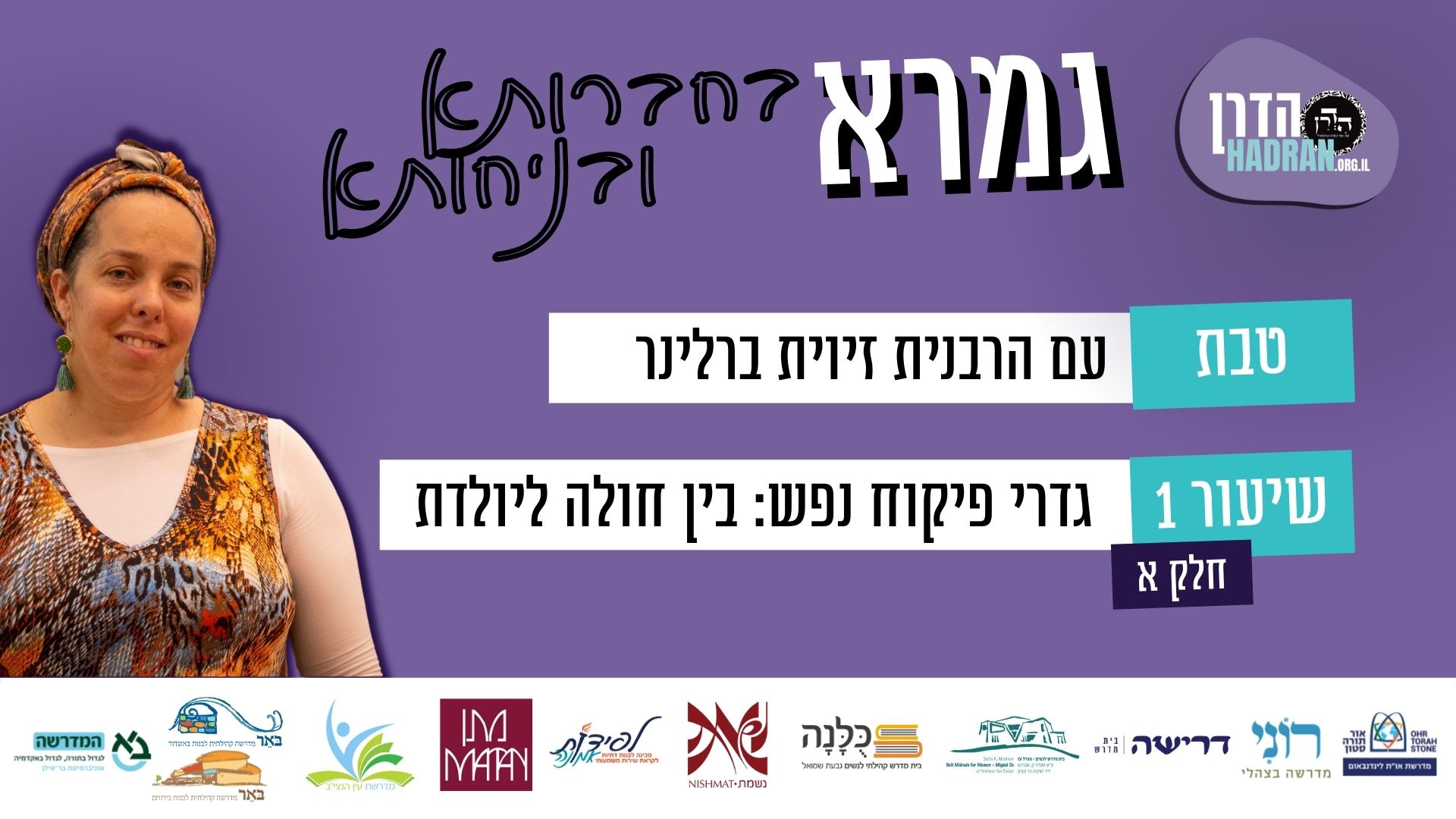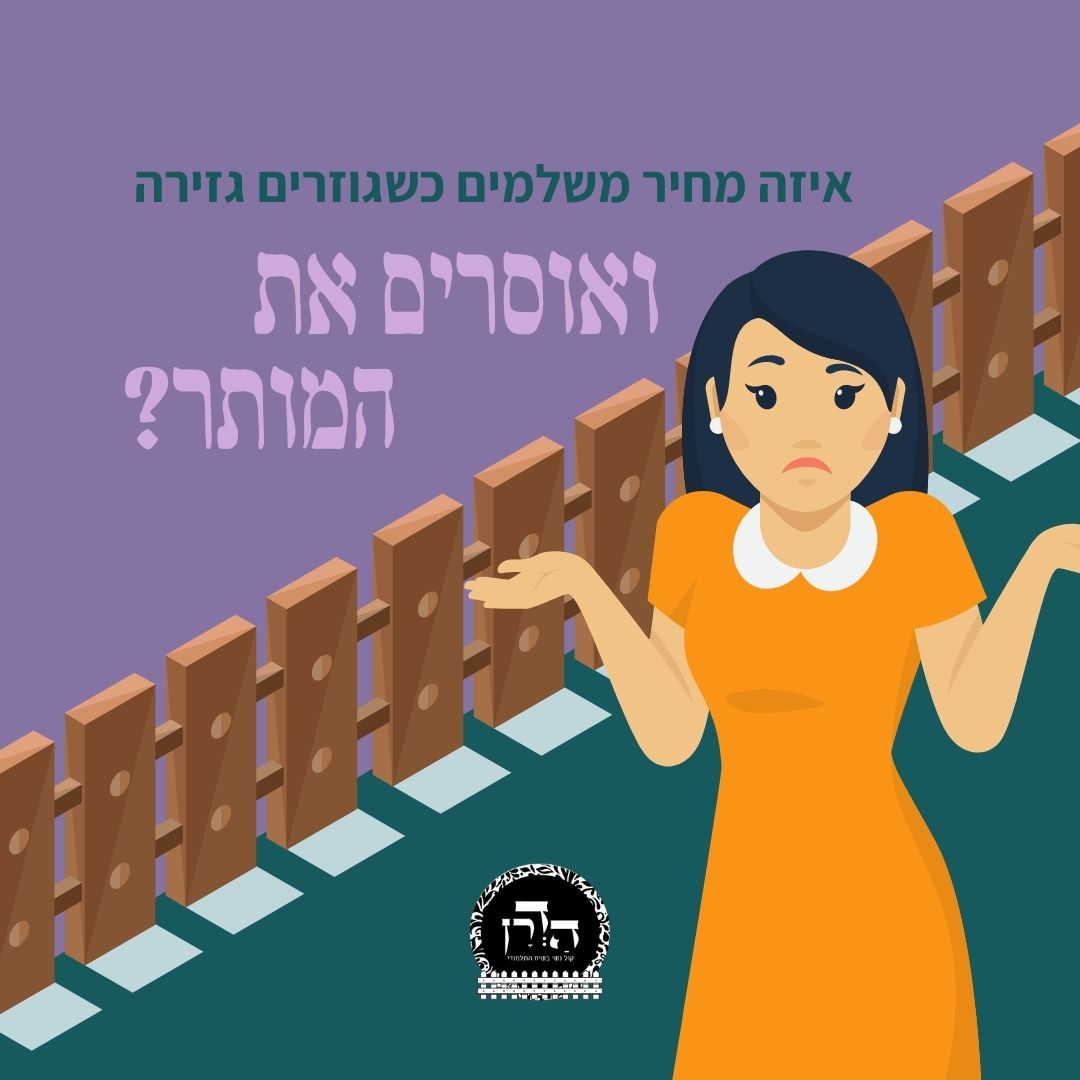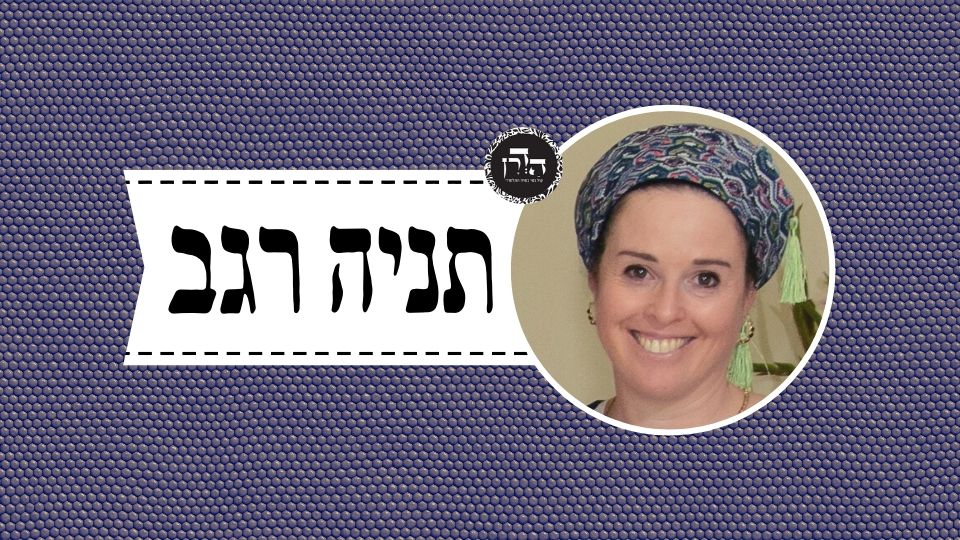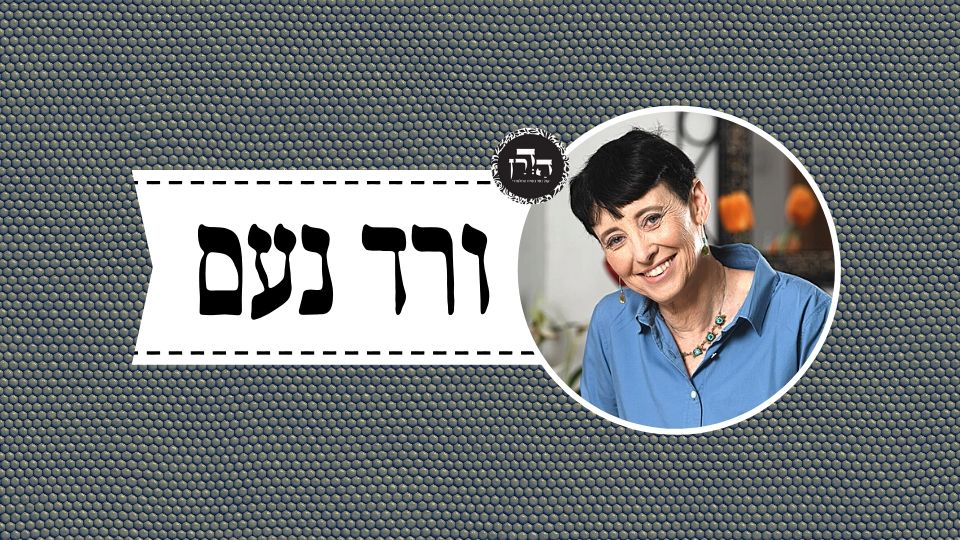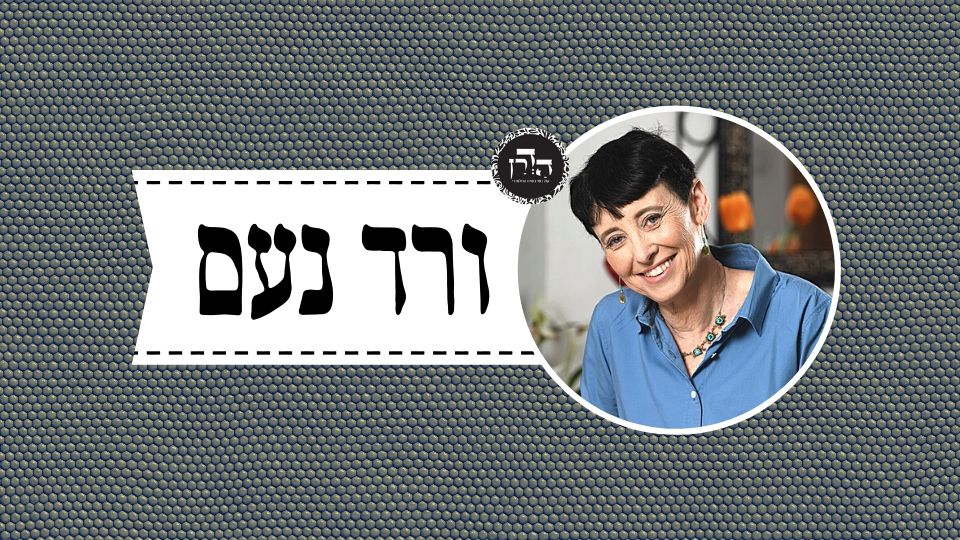שבת קכב
אֲמַר לֵיהּ: כְּאוֹתָן שֶׁל בֵּית אָבִיךָ.
Rabbi Abba bar Kahana said to him: They are like those from your father’s house, which are large (Tosafot).
וְאָמַר רַבִּי אַבָּא בַּר כָּהֲנָא אָמַר רַבִּי חֲנִינָא: קְרוֹנוֹת שֶׁל בֵּית רַבִּי מוּתָּר לְטַלְטְלָן בְּשַׁבָּת. אֲמַר לֵיהּ רַבִּי זֵירָא: בְּנִיטָּלִין בְּאָדָם אֶחָד אוֹ בִּשְׁנֵי בְּנֵי אָדָם? אֲמַר לֵיהּ: כְּאוֹתָן שֶׁל בֵּית אָבִיךָ.
And Rabbi Abba bar Kahana said that Rabbi Ḥanina said: The sedan chairs of the house of Rabbi Yehuda HaNasi may be moved on Shabbat. Rabbi Zeira said to Rabbi Abba bar Kahana: Are you referring to sedan chairs that can be moved by one person or those that can be only moved by two people? He said to him: They are like those from your father’s house.
וְאָמַר רַבִּי אַבָּא בַּר כָּהֲנָא: הִתִּיר לָהֶם רַבִּי חֲנִינָא לְבֵית רַבִּי לִשְׁתּוֹת יַיִן בִּקְרוֹנוֹת שֶׁל גּוֹי, בְּחוֹתָם אֶחָד, וְלָא יָדַעְנָא אִי מִשּׁוּם דְּסָבַר לַהּ כְּרַבִּי אֱלִיעֶזֶר, אִי מִשּׁוּם אֵימְתָא דְּבֵי נְשִׂיאָה.
And Rabbi Abba bar Kahana said: Rabbi Ḥanina permitted the members of the household of Rabbi Yehuda HaNasi to drink wine transported in a gentile’s wagons even though the wine was sealed only with one seal. He was not concerned that perhaps the gentile may have opened the barrel and poured wine libations to idolatry from it or touched it, which would prohibit drinking it. Rabbi Abba bar Kahana adds: And I do not know if that is because Rabbi Ḥanina holds in accordance with the opinion of Rabbi Eliezer, who permits drinking wine from a gentile that was protected by a single seal, or if it was because the gentile would not dare to open these specific casks due fear of the household of the Nasi, but in general Rabbi Ḥanina prohibited drinking wine protected by a single seal.
מַתְנִי׳ גּוֹי שֶׁהִדְלִיק אֶת הַנֵּר — מִשְׁתַּמֵּשׁ לְאוֹרוֹ יִשְׂרָאֵל. וְאִם בִּשְׁבִיל יִשְׂרָאֵל — אָסוּר. מִילֵּא מַיִם לְהַשְׁקוֹת בְּהֶמְתּוֹ — מַשְׁקֶה אַחֲרָיו יִשְׂרָאֵל, וְאִם בִּשְׁבִיל יִשְׂרָאֵל — אָסוּר. עָשָׂה גּוֹי כֶּבֶשׁ לֵירֵד בּוֹ — יוֹרֵד אַחֲרָיו יִשְׂרָאֵל, וְאִם בִּשְׁבִיל יִשְׂרָאֵל — אָסוּר. מַעֲשֶׂה בְּרַבָּן גַּמְלִיאֵל וּזְקֵנִים שֶׁהָיוּ בָּאִין בִּסְפִינָה וְעָשָׂה גּוֹי כֶּבֶשׁ לֵירֵד בּוֹ, וְיָרְדוּ בּוֹ רַבָּן גַּמְלִיאֵל וּזְקֵנִים.
MISHNA: If a gentile kindled a lamp on Shabbat for his own purposes, a Jew also uses its light; and if the gentile kindled it for a Jew, the Sages prohibited to utilize its light. Similarly, if a gentile drew water from a well in the public domain to give his animal to drink, a Jew gives his own animal to drink after him from the same water; and if he drew the water initially for the benefit of a Jew, it is prohibited for a Jew to give his animal to drink from that water. Similarly, if a gentile made a ramp on Shabbat to disembark from a ship, a Jew disembarks after him; and if he made the ramp for a Jew, it is prohibited. There was an incident in which Rabban Gamliel and the Elders were traveling on a ship and a gentile made a ramp on Shabbat in order to disembark from the ship on it; and Rabban Gamliel and the Elders disembarked on it as well.
גְּמָ׳ וּצְרִיכָא, דְּאִי אַשְׁמְעִינַן נֵר, מִשּׁוּם דְּנֵר לְאֶחָד נֵר לְמֵאָה, אֲבָל מַיִם לִיגְזַר, דִּילְמָא אָתֵי לְאַפּוֹשֵׁי בִּשְׁבִיל יִשְׂרָאֵל. וְכֶבֶשׁ לְמָה לִי? מַעֲשֶׂה דְּרַבָּן גַּמְלִיאֵל וּזְקֵנִים קָא מַשְׁמַע לַן.
GEMARA: The Gemara comments: And it was necessary to teach this halakha in all these cases. As, had it taught us only the halakha with regard to a lamp, I would have said that this is the halakha because the light of a lamp for one is the light of a lamp for one hundred people. There is no need to kindle multiple lamps for multiple people; the light of one candle suffices for many. Therefore, it is permitted to use the light of a lamp kindled by a gentile. However, with regard to water, there is room to issue a decree against benefitting from the gentile’s efforts, lest one come to increase the amount of water he draws for a Jew, even without stating that intention. The Gemara asks: And why do I need the mishna to mention that it is permitted to use the ramp? The Gemara answers: It taught us the case of the ramp to cite the incident involving Rabban Gamliel and the Elders to indicate that they followed this ruling in practice.
תָּנוּ רַבָּנַן: גּוֹי שֶׁלִּיקֵּט עֲשָׂבִים — מַאֲכִיל אַחֲרָיו יִשְׂרָאֵל, וְאִם בִּשְׁבִיל יִשְׂרָאֵל — אָסוּר. מִילֵּא מַיִם לְהַשְׁקוֹת בְּהֶמְתּוֹ — מַשְׁקֶה אַחֲרָיו יִשְׂרָאֵל, וְאִם בִּשְׁבִיל יִשְׂרָאֵל — אָסוּר. בַּמֶּה דְּבָרִים אֲמוּרִים — שֶׁאֵין מַכִּירוֹ, אֲבָל מַכִּירוֹ — אָסוּר.
The Sages taught: If a gentile collected grass on Shabbat for himself, in order to feed his animal, a Jew may feed his own animal after him, and if he collected it for the benefit of a Jew, it is prohibited. If he drew water to give his animal to drink, a Jew may give water to his own animal to drink after him, and if he drew it for the benefit of a Jew it is prohibited. In what case is this statement, that if the gentile acted for himself it is permitted for a Jew to benefit, said? When the gentile does not know him; however, if the gentile knows him, it is prohibited, as in that case, he certainly intended to benefit his Jewish acquaintance as well.
אִינִי?! וְהָאָמַר רַב הוּנָא אָמַר רַבִּי חֲנִינָא: מַעֲמִיד אָדָם בְּהֶמְתּוֹ עַל גַּבֵּי עֲשָׂבִים בְּשַׁבָּת, אֲבָל לֹא עַל גַּבֵּי מוּקְצֶה בְּשַׁבָּת. דְּקָאֵים לַהּ בְּאַפָּהּ, וְאָזְלָא הִיא וְאָכְלָה.
The Gemara asks: Is that so? Didn’t Rav Huna say that Rabbi Ḥanina said: One may position his animal over grass on Shabbat, even grass that is growing in the ground, and there is no concern lest he detach the grass and feed the animal; however, he may not position the animal over an item that is set aside on Shabbat, since there is concern lest one lift the item with his hand. The grass that the gentile collects for himself is certainly set aside, so why may the Jew feed it to his animal? The Gemara answers: Indeed, a Jew may not position his animal over the grass that a gentile picked; he may only position it in before the grass at a distance, and the animal goes on its own and eats.
אָמַר מָר: בַּמֶּה דְּבָרִים אֲמוּרִים — שֶׁאֵין מַכִּירוֹ, אֲבָל מַכִּירוֹ — אָסוּר. הָא רַבָּן גַּמְלִיאֵל מַכִּירוֹ הֲוָה! אָמַר אַבָּיֵי: שֶׁלֹּא בְּפָנָיו הֲוָה. רָבָא אָמַר: אֲפִילּוּ תֵּימָא בְּפָנָיו, נֵר לְאֶחָד נֵר לְמֵאָה.
We learned above that the Master said: In what case is this statement, that if the gentile acted for himself it is permitted for a Jew to benefit, said? When the gentile does not know him; however, if the gentile knows him, it is prohibited. The Gemara asks: However, in the incident involving Rabban Gamliel and the ship, it is a case where the gentile knows him as they traveled together on the ship. Abaye said: The action was not performed in Rabban Gamliel’s presence, and since the gentile had not seen him he intended to make it only for himself. Rava said: Even if you say that the gentile made the ramp in his presence, that is irrelevant because a lamp for one is a lamp for one hundred; similarly, with regard to a ramp, once the gentile constructs it for his own use it can be used by others with no further adjustments.
מֵיתִיבִי, אָמַר לָהֶן רַבָּן גַּמְלִיאֵל: הוֹאִיל וְשֶׁלֹּא בְּפָנֵינוּ עֲשָׂאוֹ — נֵרֵד בּוֹ. אֵימָא: הוֹאִיל וַעֲשָׂאוֹ נֵרֵד בּוֹ.
The Gemara raises an objection to Rava’s statement based on the Tosefta: Rabban Gamliel said to them: Since he made it not in our presence, we will disembark on it. Rabban Gamliel made use of the ramp only for this reason, contrary to Rava’s explanation. The Gemara rejects this: Say the Tosefta in an emended form: Rabban Gamliel said to them: Since he made it, we will disembark on it.
תָּא שְׁמַע: עִיר שֶׁיִּשְׂרָאֵל וְגוֹיִם דָּרִין בְּתוֹכָהּ, וְהָיְתָה בָּהּ מֶרְחָץ הַמַּרְחֶצֶת בְּשַׁבָּת, אִם רוֹב גּוֹיִם — מוּתָּר לִרְחוֹץ בָּהּ מִיָּד. אִם רוֹב יִשְׂרָאֵל — יַמְתִּין בִּכְדֵי שֶׁיֵּחַמּוּ חַמִּין! הָתָם, כִּי מְחַמְּמִי — אַדַּעְתָּא דְרוּבָּא מְחַמְּמִי.
Come and hear proof from another baraita with regard to the dispute between Abaye and Rava: With regard to a city where both Jews and gentiles live and there was a bathhouse in it in which there is bathing on Shabbat, if the majority of the city’s residents are gentiles, it is permitted to bathe in the bathhouse immediately after Shabbat because the bathhouse was heated on Shabbat to serve the gentiles. However, if there is a majority of Jews in the city, one waits after Shabbat for a period of time sufficient for them to heat the hot water so as not to benefit from prohibited labor performed on Shabbat. Apparently, even when an action is not performed in the presence of a Jew, there is concern that it may have been performed for the benefit of Jews. The Gemara rejects this proof: There, in the case of the baraita, when they heat the water, they heat it with the majority of the city’s inhabitants in mind, and the owner of the bathhouse sets the heating schedule to service the majority.
תָּא שְׁמַע: נֵר הַדָּלוּק בִּמְסִיבָּה, אִם רוֹב גּוֹיִם — מוּתָּר לְהִשְׁתַּמֵּשׁ לְאוֹרָהּ, אִם רוֹב יִשְׂרָאֵל — אָסוּר, מֶחֱצָה עַל מֶחֱצָה — אָסוּר. הָתָם נָמֵי, כִּי מַדְלְקִי —
Come and hear a proof from the following baraita: With regard to a lamp kindled at a banquet in which several people are participating, if the majority of those present are gentiles it is permitted for a Jew to utilize its light, and if the majority of those present are Jews it is prohibited, as in that case, the lamp was certainly lit for the Jews’ benefit. If those present are half Jews and half gentiles, it is prohibited. Since they are participating in the same banquet, the gentile certainly knows the Jew. Why, then, is it permitted for a Jew to utilize the light of the lamp even when the majority of those present are gentiles? The Gemara rejects this proof: There, too, when they kindle the lamp,
אַדַּעְתָּא דְרוּבָּא מַדְלְקִי.
they kindle it with the majority of the those present at the banquet in mind. When the majority of those present are gentiles, it is permitted.
שְׁמוּאֵל אִיקְּלַע לְבֵי אֲבִי תוֹרָן. אֲתָא הָהוּא גּוֹי אַדְלֵיק שְׁרָגָא. אַהְדְּרִינְהוּ שְׁמוּאֵל לְאַפֵּיהּ. כֵּיוָן דַּחֲזָא דְּאַיְיתִי שְׁטָר וְקָא קָרֵי, אָמַר: אַדַּעְתָּא דְנַפְשֵׁיהּ הוּא דְּאַדְלֵיק. אַהְדְּרִינְהוּ אִיהוּ לְאַפֵּיהּ גַּבֵּי שְׁרָגָא.
The Gemara relates that Shmuel happened to come to the house of Avin Toran. A certain gentile came and kindled a lamp. Shmuel turned his face back away from the lamp in order to avoid benefitting from the light. When Shmuel saw that the gentile brought a document and was reading it, he said: He kindled it with his own benefit in mind. He turned his face back toward the lamp.
הדרן עלך כל כתבי
מַתְנִי׳ כׇּל הַכֵּלִים נִיטָּלִין בַּשַּׁבָּת, וְדַלְתוֹתֵיהֶן עִמָּהֶן, אַף עַל פִּי שֶׁנִּתְפָּרְקוּ בַּשַּׁבָּת. שֶׁאֵינָן דּוֹמִין לְדַלְתוֹת הַבַּיִת, לְפִי שֶׁאֵינָן מִן הַמּוּכָן.
MISHNA: All vessels may be moved on Shabbat, and their doors, which are part of these vessels, along with them, even if they were dismantled on Shabbat, as the doors of these vessels are unlike the doors of the house. It is prohibited to make use of the doors of a house on Shabbat, even if they were removed from the entrance, because they are not prepared from before Shabbat.
נוֹטֵל אָדָם קוּרְנָס — לְפַצֵּעַ בּוֹ אֶת הָאֱגוֹזִין, קַרְדּוֹם — לַחְתּוֹךְ בּוֹ אֶת הַדְּבֵילָה. מְגֵירָה — לָגוֹר בָּהּ אֶת הַגְּבִינָה. מַגְרֵיפָה — לִגְרוֹף בָּהּ אֶת הַגְּרוֹגְרוֹת.
Likewise a person may move a mallet, which is generally used for labor prohibited on Shabbat, to crack nuts with it. Likewise, one may move an axe, a tool generally used to chop wood, to cut a cake of figs with it. So too, one may move a saw to cut cheese with it. Similarly, one may move a spade to scoop dried figs with it.
אֶת הָרַחַת וְאֶת הַמַּלְגֵּז — לָתֵת עָלָיו לְקָטָן. אֶת הַכּוּשׁ וְאֶת הַכַּרְכֵּר — לִתְחוֹב בּוֹ. מַחַט שֶׁל יָד — לִיטּוֹל בּוֹ אֶת הַקּוֹץ. וְשֶׁל סַקָּאִים — לִפְתּוֹחַ בּוֹ אֶת הַדֶּלֶת.
One may also move a winnowing shovel and a pitchfork, both of which are designated for use with crops in a barn, to place food on it for a child. One is likewise permitted to take a reed or a shuttle from a spindle, ordinarily used for weaving, in order to insert it into food like a fork. One is permitted to move an ordinary hand needle used for sewing clothes to extract a thorn with it, and one may move a sack maker’s needle to open the door with it.
גְּמָ׳ כׇּל הַכֵּלִים נִיטָּלִין, וְאַף עַל פִּי שֶׁנִּתְפָּרְקוּ בַּשַּׁבָּת, וְלָא מִיבַּעְיָא בְּחוֹל.
GEMARA: The mishna states: All vessels may be moved, and even if they were dismantled on Shabbat. Should we learn from here that there is only a question with regard to vessels which were dismantled on Shabbat, and that there is no need to mention vessels detached during the week, as it is certainly permitted to carry them on Shabbat?
אַדְּרַבָּה, בַּשַּׁבָּת מוּכָנִין עַל גַּבֵּי אֲבִיהֶן, בַּחוֹל אֵין מוּכָנִין עַל גַּבֵּי אֲבִיהֶן!
On the contrary, if they were dismantled on Shabbat it can be said that the parts of the vessel were prepared for use at the onset of Shabbat, due to their being attached to their original vessels from which they were removed. However, if they were detached during the week, at the onset of Shabbat they would not have been prepared for use, due to their being detached from their original vessels from which they were removed.
אָמַר אַבָּיֵי, הָכִי קָאָמַר: כׇּל הַכֵּלִים נִיטָּלִין בַּשַּׁבָּת וְדַלְתוֹתֵיהֶן עִמָּהֶן. אַף עַל פִּי שֶׁנִּתְפָּרְקוּ בַּחוֹל — נִיטָּלִין בַּשַּׁבָּת.
Abaye said that this is what the mishna is saying: All vessels may be moved on Shabbat along with their doors. And even if they came apart during the week, they may be moved on Shabbat.
תָּנוּ רַבָּנַן: דֶּלֶת שֶׁל שִׁידָּה וְשֶׁל תֵּיבָה וְשֶׁל מִגְדָּל — נוֹטְלִין אֲבָל לֹא מַחֲזִירִין. וְשֶׁל לוּל שֶׁל תַּרְנְגוֹלִים — לֹא נוֹטְלִין וְלֹא מַחֲזִירִין.
The Sages taught: With regard to the door of a chest, or of a box, or of a closet, one may remove them from their hinges on Shabbat, but he may not restore them to their original places. And with regard to the door of a chicken coop, one may neither move it nor restore it to its place.
בִּשְׁלָמָא שֶׁל לוּל שֶׁל תַּרְנְגוֹלִים, קָסָבַר: כֵּיוָן דִּמְחַבְּרִי בְּאַרְעָא — יֵשׁ בִּנְיָן בְּקַרְקַע יֵשׁ סְתִירָה בְּקַרְקַע. אֶלָּא שֶׁל שִׁידָּה וְשֶׁל תֵּיבָה וְשֶׁל מִגְדָּל, מַאי קָסָבַר?
Granted, in the case of a chicken coop the tanna holds: Since the coop is attached to the ground, there is a prohibition against building on the ground and there is a prohibition against dismantling on the ground. Consequently, when one dismantles or restores the door he has performed the prohibited labor of building. However, in the case of the door of a chest, or a box, or a closet, what does he hold?
אִי קָסָבַר יֵשׁ בִּנְיָן בְּכֵלִים — יֵשׁ סְתִירָה בְּכֵלִים, וְאִי אֵין סְתִירָה בְּכֵלִים — אֵין בִּנְיָן בְּכֵלִים?
If the tanna holds that there is a prohibition against building with regard to vessels, then there is also a prohibition against dismantling with regard to vessels and it should be prohibited to remove the door. And if there is no prohibition against dismantling with regard to vessels and it is permitted to remove the door, then there should also be no prohibition against building with regard to vessels. Why, then, is it prohibited to restore a door to its original place?
אָמַר אַבָּיֵי: לְעוֹלָם קָסָבַר יֵשׁ בִּנְיָן בְּכֵלִים וְיֵשׁ סְתִירָה בְּכֵלִים, וְשֶׁנִּיטְּלוּ קָאָמַר.
Abaye said: Actually, he holds that there is a prohibition against building with regard to vessels and there is also a prohibition against dismantling with regard to vessels. To resolve the difficulty, emend the text. Rather than saying: One may remove them, it is saying: The doors of a chest, or a box, or a closet that were already removed may not be restored.
אֲמַר לֵיהּ רָבָא: [שְׁתֵּי תְּשׁוּבוֹת בַּדָּבָר]. חֲדָא, דְּ״נִיטָּלִין״ קָתָנֵי, וְעוֹד: מַאי ״אֲבָל לֹא מַחֲזִירִין״? אֶלָּא אָמַר רָבָא, קָסָבַר: אֵין בִּנְיָן בְּכֵלִים וְאֵין סְתִירָה בְּכֵלִים — וּגְזֵירָה שֶׁמָּא יִתְקַע.
Rava said to him: There are two possible responses with which your statement can be rejected. One is that it is taught in the baraita: One may remove them, ab initio. And furthermore, what is the meaning of: But one may not restore them? According to your emendation, what is the meaning of the word, but, in this context? Rather, Rava said: The tanna holds that there is no prohibition against building with regard to vessels and there is no prohibition against dismantling with regard to vessels, and so why did the tanna rule one may not restore the door? It is due to a decree lest one fix it firmly in place in the manner of a full-fledged prohibited labor, completing the production process of a vessel.
נוֹטֵל אָדָם קוּרְנָס כּוּ׳. אָמַר רַב יְהוּדָה: קוּרְנָס שֶׁל אֱגוֹזִין לְפַצֵּעַ בּוֹ אֶת הָאֱגוֹזִין, אֲבָל שֶׁל נַפָּחִין — לֹא.
The mishna states: A person may take a mallet on Shabbat in order to crack nuts with it. Rav Yehuda said: The type of hammer in this case is a hammer designated for nuts to crack nuts with it, but blacksmiths’ hammers, no, they may not be used.
קָסָבַר דָּבָר שֶׁמְּלַאכְתּוֹ לְאִיסּוּר, אֲפִילּוּ לְצוֹרֶךְ גּוּפוֹ — אָסוּר.
That tanna holds that using an object whose primary function is for a prohibited use, even for the purpose of utilizing the object itself to perform a permitted action, is prohibited.
אֲמַר לֵיהּ רַבָּה: אֶלָּא מֵעַתָּה, סֵיפָא דְּקָתָנֵי: וְאֶת הָרַחַת וְאֶת הַמַּלְגֵּז לָתֵת עָלָיו לְקָטָן, רַחַת וּמַלְגֵּז מִי מְיַיחֲדִי לֵיהּ לְקָטָן?! אֶלָּא אָמַר רַבָּה: קוּרְנָס שֶׁל נַפָּחִין לְפַצֵּעַ בּוֹ הָאֱגוֹזִין,
Rabba said to him: But if what you say is so, how do you reconcile this with the latter clause of the mishna in which it is taught: And a winnowing shovel or a pitchfork in order to place food for a child on it; are a winnowing shovel and a pitchfork designated for use by a child? Rather, Rabba said: The mishna should be interpreted as follows: One may use a blacksmiths’ hammer on Shabbat to crack nuts with it.
קָסָבַר:
The tanna holds:



